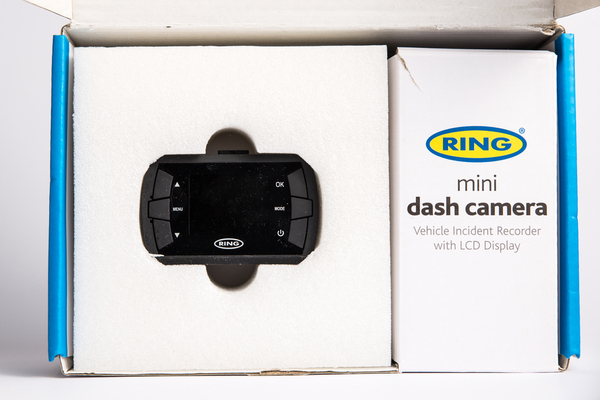Last Thursday, Ring, the home security subsidiary of Amazon, released a new dashcam embedded with a novel feature called “Traffic Stop” that could help bring more accountability to policing. That could be a powerful thing, especially as tens of millions of people have poured onto the streets in cities across the country to demonstrate against systemic racism, white supremacy, and police brutality. But, it could also be a privacy nightmare.
The Ring Car Cam, which will cost $199, has two cameras: one pointed out the front windshield and one that points toward the car’s interior. The camera can send alerts whenever an event such as a break-in, towing, or accident is detected, and owners can tap into the cameras’ feeds to see what’s happening. The Car Cam relies on either Wi-Fi or LTE for connectivity.
But the most interesting feature is Traffic Stop. All a driver needs to do is say “Alexa, I’m being pulled over” to trigger the cameras to start recording and save their footage to the cloud. At the same time, a notification will be sent to a list of emergency contacts specified by the user during initial setup, informing them of the traffic stop.
Essentially, what Ring has created is a tool for “traffic stop counter-surveillance,” said Elizabeth Joh, a professor of law at UC-Davis and an expert on policing, technology, and surveillance. “In policing, technology is all about power. Redistributing that power can be an important means of police accountability.”
There’s nothing particularly new about using dashcams as a means of recording traffic stops, but the novelty of Ring’s Traffic Stop feature is that it automates the process, Joh said. “We’ve always been able to pull out our phones… and try to record it,” she said. “But by embedding it in the landscape of our cars, by simply just saying ‘I’ve been pulled over,’ makes that recording much more likely.”
That’s especially meaningful when you consider that police body cameras can be unreliable, hard to obtain, or subjective in what they capture. “Easily recording a traffic stop from a driver’s perspective is going to be able, in theory, to give us an important part of what’s happening in these encounters that sometimes go badly wrong,” Joh added. And if people are willing to share the footage from their traffic stop with academic researchers, that can be incredibly useful for better understanding excessive force and police violence during traffic stops.
But there are also privacy implications. After all, it’s a camera that sits on your dashboard and sends video, audio, and perhaps GPS information to the cloud. Passengers in vehicles equipped with the Ring Car Cam may not be able to consent to being filmed before the device starts recording. And Ring as a company has been criticized for sharing data with police departments without informing their customers.
“What if the prompt is used for bad purposes?” Joh asks. “Say you’re not actually being pulled over or someone just wants to record you. And if the traffic stop video has embarrassing information, it’s in the cloud.” She added, “There are good questions about who has access to that information. And I’m not just talking about the police, but somebody who works at Ring. Do they just get to watch it?”
Ring has said the most important thing about the Car Cam is access to the footage. While many dashcams include a removable SD card, Ring’s camera automatically uploads the footage to the cloud, giving customers more immediate access to what was recorded. “The most important thing in these situations is to make sure that you have the video and so we’ll be streaming the video from the Car Cam to the cloud in real time,” Ring’s head of mobile products, Nathan Ackerman, told CNET.
As for who else should have access to that footage, Ring is still working through those questions. “We’re working through some of the ins and outs of exactly when the [emergency contacts] get notified, whether they can jump in and view the live stream or if it’ll be available after the fact,” Ackerman said. These will be important questions for Ring to answer, especially if it hopes to win over people who are aware of the company’s controversial partnerships with police departments.
“I think for privacy-minded and civil liberties-minded consumers, they’re going to be really skeptical about whether or not Ring has some other purpose or agenda in mind in making this video capturing really easy,” Joh said. “But maybe that’s beside the point, because if Ring doesn’t do it, I think it was inevitable that another technology company was going to do it.”
—
Photo Credit: Joshua Sanderson Media / Shutterstock.com
